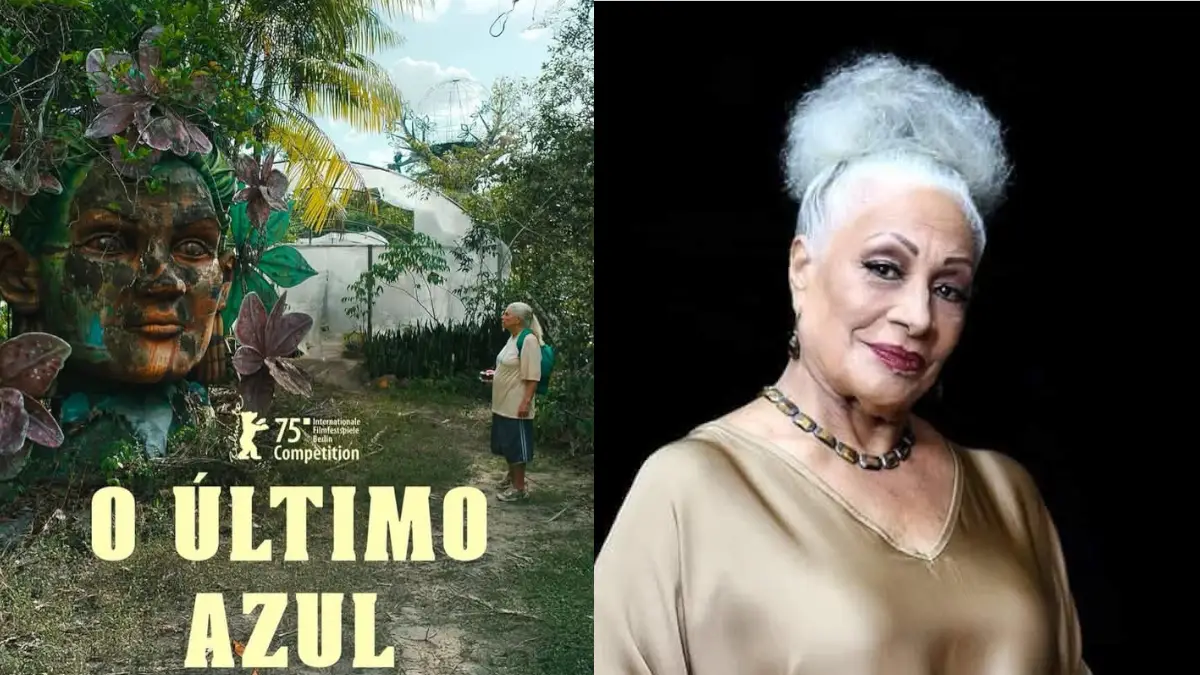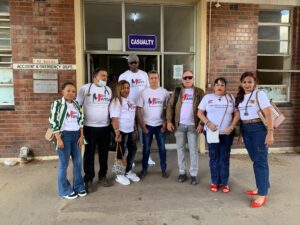Miriam Socarrás is part of the cast of the Brazilian film O Último Azul (international title: The Blue Trail), directed by Gabriel Mascaro, which will compete in the official section of the 75th Berlin International Film Festival, known as the Berlinale. The film, directed by Gabriel Mascaro, will compete in the official section of the 75th Berlin International Film Festival, known as the Berlinale, which runs from Thursday until 23 February. In this film, the outstanding Cuban actress shares the screen with renowned actors such as Denise Weinberg and Rodrigo Santoro.
For Socarrás, this opportunity is an unexpected and deeply moving event. «I am a person who longs and dreams for what I know is possible to achieve. As a supporting actress in Cuban cinema, I had never imagined something so big, so important and so distant from my life,» she confessed in an exclusive interview with Juventud Rebelde.
«I’m going to participate in one of the most important festivals in the world, and I still can’t believe it. It’s a gift that life has given me, already an octogenarian, when opportunities for actors are increasingly scarce,» says this woman, who in O Último Azul plays the character of Roberta, «a very tough woman, who can’t set foot on land and lives on her boat.
«She is an illegal woman, always on the run, and extremely lonely. I can’t reveal more details, you’ll have to see the film. I can only say that I thoroughly enjoyed playing her and that this role is very different from anything I’ve done before in film».
-How did you receive the news that O Last Blue would compete for the Golden Bear?
-When I received the news that O Último Azul had been nominated for the Golden Bear, I was overjoyed. It is an honour that a film in which I participated is recognised at such a prestigious event as the Berlinale. But what I never imagined was that I would also be there, being part of that experience.
«When they confirmed that I would travel to the festival, I couldn’t believe it. It was something incredible, unexpected, like a gift that life had in store for me. At my age, you think you’ve lived everything, that the great moments have passed, and suddenly this comes along. It’s not only a personal joy, but also a source of pride to be able to represent Cuban cinema on such an important international stage.
-After so many years of career, how does it feel to represent Cuba in a Brazilian production at such a prestigious festival?
-Representing Cuba fills me with pride because I am Cuban like the palms of my hands. Although I don’t drink coffee, I carry in me the essence of this land. Being Cuban is a deep feeling, and to be able to bring that spirit to an international stage is always an immense honour. Knowing that my participation in O Último Azul brings a little piece of Cuba to such a prestigious event fills me with emotion and gratitude.
«I have never had this opportunity before. It’s like a small wound, a scar that remains, but, as a good Cuban, I take it with humour, because at this stage of my life, few things affect me too much. For me, the most important thing is the respect and admiration of the public, and I have plenty of that. It amuses me a lot when people recognise me in the street, say nice things to me and want to take pictures with me, especially young people. That’s the Cuban people. That’s the Cuban public: sincere, direct, critical. If they like something, they tell you; if they don’t, they tell you too. And that’s why I love them so much.
-How was the experience of filming in such a challenging environment as the Amazon?
-Filming in the Brazilian Amazon was like entering a subjugating, different and unknown world. From the first moment I knew it would be a challenge, but I took it on with the freshness and enthusiasm that characterises me. Before travelling, I was asked if I had any mobility problems. I, no stranger to challenges, sent a photo of me riding a horse at a friend’s house. Of course, the hard part was not getting on, but getting off afterwards,» she laughs.
«I’ve never been one to get seasick. I’ve been on sailing boats in Mallorca, I’ve dived into the sea, and I’ve never felt vertigo or discomfort. On the river I never felt it either. I prepared myself to handle a huge boat, an exercise that required more physical effort than I imagined. Turning the rudder demanded tremendous strength, but every effort was worth it.
«The Amazon is a haven of peace. The river flows calmly, without the roar of the sea. As you approach the shore, the landscape becomes fascinating: floating houses adorned with robust plants; the movement of children in canoes from one house to another, with the naturalness of someone walking down a street; a very fine drizzle, like tiny pins, falling almost imperceptibly; the warmth of its people; the mystery of the jungle and the fascinating creatures that hide beneath the waters of the Amazon. All this made me appreciate life from a different perspective, to understand that happiness exists in any corner of the world, even in the farthest corners of our own.
«I am a hyperactive woman, but I found calm there. The Amazon gave me a time of introspection and connection with nature. Amidst the tranquillity of the river, I understood that, despite the stress of the big cities and the hectic pace of life, there are always places where peace still reigns. And that, without a doubt, is one of them».
-What attracted you to Brazilian cinema and Gabriel Mascaro’s vision as a director?
-I have always liked Brazilian cinema very much. We Cubans feel a close connection with Brazilian cinema, in the same way that we like their soap operas so much. I find the way they make films very interesting and attractive, plus Brazil has great filmmakers and actors.
«Gabriel, the director, is a very self-confident person. He was always clear about what he wanted to do. For me personally, he prepared me with a coach, who was the one who helped me work on the scenes long before I met him. When we met, rehearsals started and it was a very good and useful experience for me. Rehearsals are fundamental because, when you get to the shooting, you already have the scenes ready, you know what you want to transmit.
«Gabriel has a very direct approach. Despite the different shots that had to be repeated, he managed to get the scenes out quickly. In this type of shooting, long shots are not uncommon, but the attention to detail was meticulous. Gabriel is a person who remains calm at all times. He doesn’t get irritated, he has a constant gentleness and that’s very important for any actor. He was always relaxed and full of joy.
«The most important thing for me as an actress is to work with a director who knows what he wants and, at the same time, allows you to contribute small details, like an expression or a movement. Gabriel was always willing to listen and give space for those contributions. There are directors who don’t allow that, but he does.
-What do you hope audiences and critics will take away from O Último Azul?
-I feel that I have worked on a script that is so solid, so contemporary, so representative of these complex times worldwide, that people who love peace, freedom and respect for others will feel deeply identified with this film.
The participation of O Último Azul at Berlinale 2025 marks the first time since 2020 that a Brazilian production has competed for the Golden Bear. The film’s world premiere is scheduled for the festival, and it is expected to hit Brazilian cinemas later in the year.
Socarrás, who was once called «the empress of supporting roles», has proven throughout her career that there is no such thing as a small role, but rather an actor who knows how to make it big. With her presence in Berlin, the Cuban actress carries with her not only the pride of her country, but also the hope that artistic maturity will continue to have a place in international cinema.
Discovering The Last Blue
The plot of O Último Azul is set in a dystopian Amazonia, where Tereza (played by Weinberg), a 77-year-old woman, is forced to move to a housing colony for the elderly due to a government policy that seeks to allow youth to produce without concern for the elderly.




